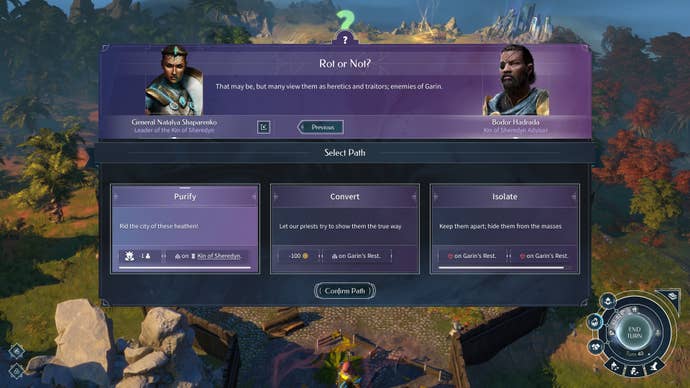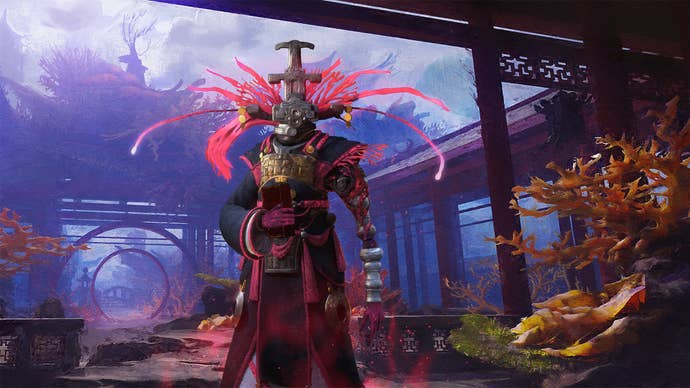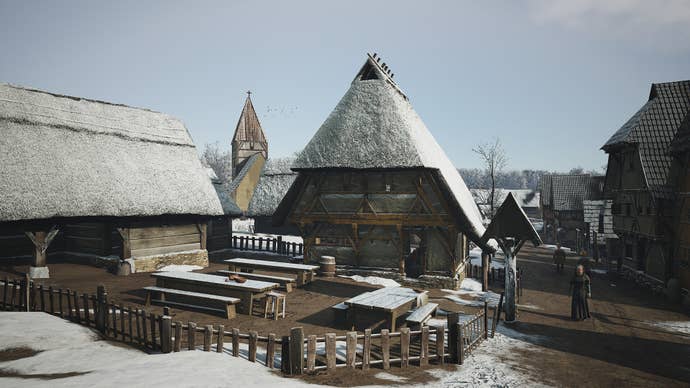Sega are among the big games publishers who are currently feeding large swathes of their business to the flames of profit growth. In September 2023, they cancelled Creative Assembly’s looter shooter Hyenas and announced plans to cut costs across Sega Europe. Last January, they laid off 61 workers at Sega of America in California. Then, they chopped another 240 jobs across Creative Assembly, Hardlight, and other Sega operations in Europe.
Grim times, but there have been brighter moments. In November last year, Endless Legend and Humankind developers Amplitude Studios announced that they were splitting from Sega and going independent, care of a management buyout or MBO. Without wishing to sound too fatalistic about Sega, it put me somewhat in mind of the Millennium Falcon flying out of the exploding Death Star. Amplitude’s co-founder and CEO Romain de Waubert de Genlis tells me, however, that the Amplitude buyout wasn’t an emergency response to Sega’s restructuring. He himself started thinking about going indie over two years ago.
“I don’t think I was really happy in the organization, and with how things were,” he explains over videocall, following a hands-on with Amplitude’s forthcoming Endless Legend 2. “And for the first time, I started looking at other offers.” Amplitude’s other co-founder, Mathieu Girard, had left in 2018 to found Tactical Adventures, developers of Solasta: Crown of the Magister. For a while, de Waubert de Genlis considered proposals to start a new studio himself. “I was offered very cool stuff [but] each time I thought about it, I realised I was just about to recreate Amplitude. I will want to work with the same people, but I can’t – why do that, really?”
Eventually, he decided to approach the higher-ups at Sega about a management buyout. The first of these discussions took place around “a year and a half ago”, and was a source of some trepidation; de Waubert de Genlis notes that there are cultural differences to manage when negotiating with Japanese executives. Given Sega’s public plans to trim the fixtures, you might expect the publisher to have jumped at the chance to part ways with Amplitude. De Waubert de Genlis acknowledges that “there were reorganisations happening at the same time in some of the units, and it led to a lot of things happening within Sega and us.” Nonetheless, “it was not an obvious yes or no. It was, oh, interesting that you bring it up.”
In addition to convincing Sega that they and Amplitude would be better off apart, de Waubert de Genlis had to convince the publisher that a management buyout was the best approach; he doesn’t discuss the alternatives, but I imagine one of them would have been flogging Amplitude to another company. “I was asking for quite a lot,” he concedes. “It was like OK, I’d love to leave, but if I leave, I would leave with the intellectual property, with all of the people untouched, and keep them together, and the Games2Gether service we have on the site to bring players closer to the games.”
Sega’s willingness to entertain these negotiations speaks to de Waubert de Genlis’s insistence that Amplitude and Sega have always had a “good relationship”. Why, then, did he want to leave so badly? Partly, he says, because it felt stifling to work under a vast international corporation with its own protocols and wider priorities. It made it “hard to really push a lot of what we loved”, and obliged de Waubert de Genlis to spend a lot of time haggling with people up the chain.

“It was a place where we had quite heavy processes and, for games like the games we are making, especially, you know, some of us still being very close to the ideas and the concepts – it did not always help us to make better games,” he says. “Because your focus was really on managing the expectations and the processes.”
De Waubert de Genlis qualifies this by saying that Amplitude had “a lot of freedom” in terms of the content of their games. Sega’s interventions as parent company were never “personal”, he comments; they were “more about the numbers, and it was very pragmatic”. Still, de Waubert de Genlis had grown weary of discussing and justifying Amplitude’s decisions to Sega. “I wanted to spend more time closer to the game.”
While de Waubert de Genlis doesn’t quite spell this out, it also sounds like Sega’s higher-ups had trouble making sense of the 4X strategy genre, which he describes as “quite a weird niche” dominated by one particular series. “When you look at Civilization, it’s huge,” he goes on. “When you look at Humankind, it’s very big. And in a way, all our games are big, but, you know, they’re big with a long tail, basically. It’s not like you ship the game and day one, you have a million players coming in, and you move on to the next game. It’s not how our games work. They tend to be long tail games, but with a small bump at the beginning. So yes, it was difficult to find the right way to exist with this specific community, specific players within that environment.”
The announcement release for Amplitude’s MBO describes it as being “led by senior leaders and employees.” As you might expect, de Waubert de Genlis can’t tell me where, exactly, all the money for the MBO has come from, but rustling up the funds wasn’t easy. “When I first approached Sega to do the MBO, I had a set of investors that were really ready to go all for it,” he says. “By the time we finished the process more than a year later, they were all gone.”

Fortunately, Amplitude were able to find other backers. “When I felt like we did not have enough money secured, I managed to have banks following,” de Waubert de Genlis says. “I think the chance that we had is [that under] the deal we were discussing, we had IPs, we had games that were partially developed and soon to release – in this case, Endless Legend 2. It was a bit easier than saying, hey, in one or two years from now, I will have a game that will be very cool and a new IP.”
Amplitude’s case for funding was also strengthened by the fact that the majority of devs who worked on the company’s most successful games are still employed at the studio. A portion of the funding eventually came from some of those very same devs. 35 of Amplitude’s current 170 staff contributed to the buyout, pitching in a minimum of 10,000 euros to buy shares in the company. “It is significant – not everyone can take that level of risk,” de Waubert de Genlis says.
With Sega mostly out of the picture, and Amplitude not currently in a position to publish their own games, Endless Legend 2 is being published by Manor Lords and Against The Storm outfit Hooded Horse. It’s hard to think of a better partner for Amplitude, creator of such weirdo 4X factions as the Roving Clans, than Hooded Horse, a sustainability-minded newcomer with an almost frightening appetite for eccentric smaller strategy projects. De Waubert de Genlis certainly thinks they’re a natural fit. “I was, I think maybe six months before going indie,” he says. “And I suddenly realized that maybe the last six or eight games I played, were all Hooded Horse. And I was really puzzled. I mean, these guys are making games for me.”

Soon after the MBO announcement, a mutual contact put him in touch with Hooded Horse’s founders Tim Bender and Snow Rui. De Waubert de Genlis and Bender had a one hour phone call, and got along like a burning house. “It was the fastest deal in my life, basically,” de Waubert de Genlis says. “In two weeks it was done. We knew we wanted to announce also Endless Legend 2 soon, so we had little time, but it was the most efficient deal ever.”
I’m conscious throughout my chat with de Waubert de Genlis that there’s a lot I’m not being told. As with Endless Legend 2’s flooded worlds, there are doubtless many secrets beneath the surface. I don’t know what discussions Sega’s bosses had about Amplitude’s future – whether they were considered for mass layoffs, as with Relic Entertainment (also now independent), or whether any other publishers pitched to buy the studio. I don’t know how much of de Waubert de Genlis’s overall warm characterisation of Sega is just lip service to former and, possibly, future business partners.
Still, I’m happy that Amplitude are apparently in a position to experiment more freely and delve ever deeper into the 4X niche. And given the on-going spate of layoffs and closures, I’m hopeful that other studios might find the wherewithal to follow in their footsteps.







